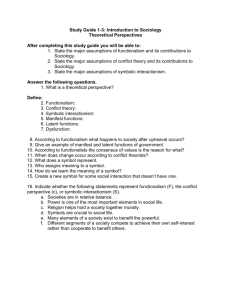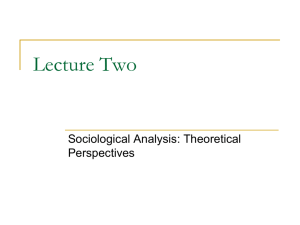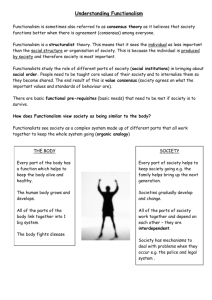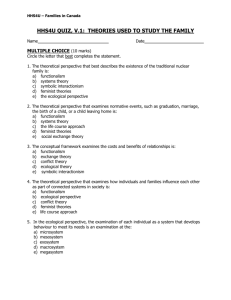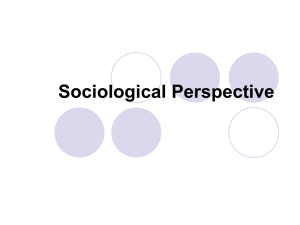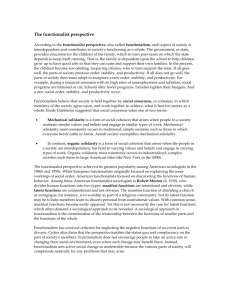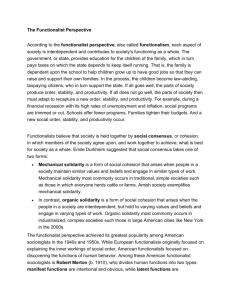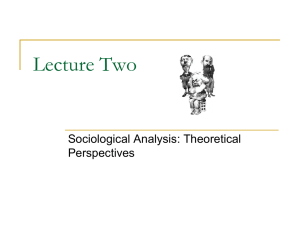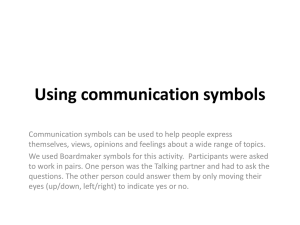An invitation to sociology
advertisement
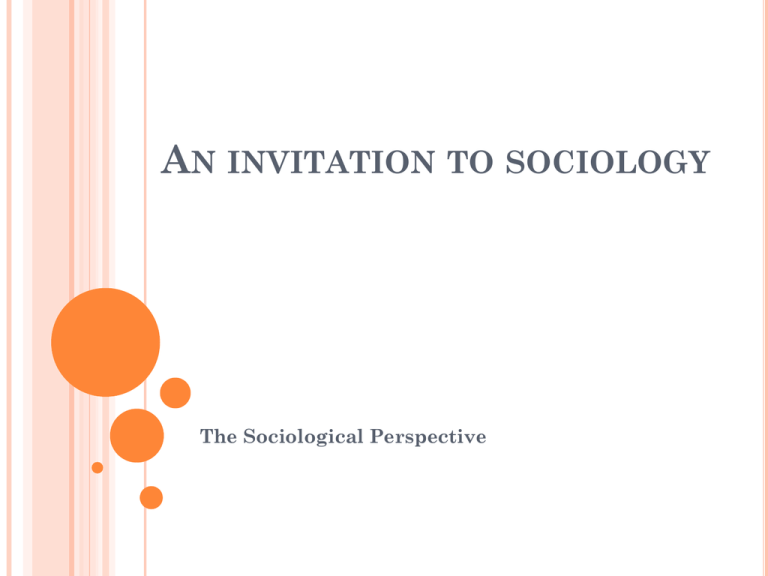
AN INVITATION TO SOCIOLOGY The Sociological Perspective What is Sociology? the scientific study of social structure Social Structure Sociological Findings Verses Common Sense True or False 1. More U.S. students are killed in school shootings now than ten or fifteen years ago. 2. The earnings of U.S. women have just about caught up with those of U.S. men. 3. When faced with natural disasters such as floods and earthquakes, people panic and social organization disintegrates. 4. People who commit rape and sexual assault are mentally ill. 5. Most people on welfare are lazy and looking for a handout. They could work if they wanted to. 6. Compared with women, men maintain more eye contact while they are conversing. 7. The more available alcohol is (as measured by the number of places to buy alcohol per one hundred people), the more alcohol related injuries and fatalities occur on U.S. highways. 8. Couples who live together before marriage are usually more satisfied with their marriages than couples who do not live together before marriage. 9. When husbands of working wives get laid off from work, most take up the slack and increase the amount of housework they do. 10. Students in Japan are under such intense pressure to do well in school that their suicide rate is about double that of U.S. students. 1. Someone who can’t find a job is ___________________. 2. Homelessness is the result of _____________________. 3. Illegal immigrants come here because of ___________. Personal Societal Sociological Perspective Are More Heads Better Than One? How many pennies are in the jar? Class average? How many came closer to the actual number than the group? Conclusion: Many times groups solve problems better than individuals Why do people conform? Groups tend to think, feel and behave in similar ways elevator conformity The Social Sciences • Sociology – investigates human behavior from group (not individual) perspective • Anthropology – closely related, focus on preliterate societies • Psychology - mental and emotional processes and functioning of the individual • Economics – studies production, distribution and consumption of goods and services • Political Science – organization, administration, history, and theory of government • History - past events in human societies Sociological Imagination Who was August Comte, and why does he matter? • Frenchman • Father of Sociology • 1st to advocate scientific study of society (positivism) Positivism: the belief that knowledge should be derived from scientific observation 1798-1857 Believed people’s behavior within a group cannot be predicted by their personal characteristics (bronze) Comte’s Big Ideas Social Statics: the study of social stability and order Social Dynamics: the study of social change Harriet Martineau… the first feminist? • Englishwoman • Popular writer, Society in America • drew link between slavery and oppression of women • inspired future feminist theorists 1802-1876 Ebenezer Scrooge…Social Commentary Herbert Spencer and Darwinism • Social Darwinism • natural social selection and survival of the fittest society • opposed social reform – to interfere would be harmful to society in long run 1820-1903 “What is not good for the hive is not good for the bee.” Marcus Aurelius Antonius (121-180) occupy movement Karl Marx & class conflict • German scholar • poverty and inequality of the working class • bourgeoisie: class owning the means for producing wealth (capitalists) • proletariat: working class, those who labor for bourgeoisie 1818-1883 Class Conflict • eventually wage workers would overthrow capitalists • result in communistic society (one without classes) Emile Durkheim • Frenchman • Consensus (solidarity) of society • mechanical solidarity • organic solidarity • Studied Suicide: believed suicide is related to the strength of shared beliefs among group members (solidarity) 1858-1917 More About Durkhiem First to stress statistical techniques Anecdotal vs. Scientific Data Who was Max Weber? • German law & economics professor • verstehen: understanding others by “putting yourself in their shoes” • rationalization: mindset that emphasizes knowledge, reason, and planning 1864-1920 Jane Addams and Hull House • American social reformer • poor, immigrants, sick, aged • believed society should help the less fortunate 1860-1935 W.E.B. Dubois’ Contributions • African American social activist • doctorate degree from Harvard • used science and sociology to disprove racist assumptions about African Americans 1868-1963 Theoretical Perspective • a set of assumptions accepted as true • in sociology, assumptions about the workings of society What is a Theoretical Perspective? Theoretical Perspective: a set of assumptions accepted as true FUNCTIONALISM Emphasizes the contributions (functions) of each part of a society • A society is a relatively integrated whole • A society tends to seek relative stability • Most aspects of a society contribute to the society’s well-being and survival • A society rests on the consensus of its members Functionalism Functionalism: approach that emphasizes the contributions made by each part of society • contributes to society by providing for the reproduction and care of its new members Functionalism • contributes to society by emphasizing beliefs and practices that are sacred • kill • steal…. FUNCTIONALISM Contributes by ensuring Survival of society by passing On essential knowledge/skills “Religion is the opiate of the masses.” Functionalism Economics: contributes to society by dealing with the production, distribution, and consumption of goods and services Functionalists: see parts of a society as an integrated whole • a change in one part of society leads to changes in others • Example: pre and post-Industrial Revolution What do functions do? …If they didn’t, they would disappear. Manifest and Latent Functions Robert Merton Manifest functions: intended and recognized Q: Manifest function of school? A: Education Latent Functions: unintended and unrecognized aspects of society Q: Latent Function of School? A: development of close friendships Dysfunctions: negative consequences of an aspect of society Consensus of society that these two aspects were dysfunctional CONFLICT PERSPECTIVE • A society experiences inconsistency and conflict everywhere • A society is continually subjected to change • A society involves the constraint and coercion of some of its members Conflict Perspective Conflict Perspective: approach emphasizing the role of conflict, competition, and constraint within a society Conflict and Constraint Those with the most power are able to constrain (or limit) the less powerful. Functionalism Conflict Perspective A society is an integrated whole A society experiences inconsistency and conflict everywhere A society tends to seek relative stability A society is continually subjected to change A society rests on the consensus of its members A society involves the constraint and coercion of some members by others Conflict Perspective and Social Change Men -Women Whites - Minorities pencil = clock pen = stapler paper = projector desk = closet tablet = shoe write = dribble down = up snack = door handle party = nosebleed year = waffle I want you to take out a clock or a stapler and some projector and put it on your closet. It’s OK if you leave it in your shoe for now. I want you to dribble up your favorite door handle for a class nosebleed at the end of the school waffle. Symbolic Interactionism Focuses on the actual interaction among people through the use of shared symbols Symbol: anything that stands for something else and has an agreed upon meaning attached to it aunts, uncles, brothers, sisters employers, employees teachers, students Three Assumptions About Symbolic Interactionism We learn the meaning of a symbol by the way we see others reacting to it. Once we learn the meanings of symbols, we base our behavior (interaction) on them. We use the meaning of symbols to imagine how others will respond to our behavior Dramaturgy • approach that sees human interaction as theatrical performances Erving Goffman Assumptions of the Major Theoretical Perspectives Functionalism Conflict Perspective Symbolic Interactionism 1. A society is a relatively integrated whole. 1. A society experiences inconsistency and conflict everywhere. 1. People’s interpretations of symbols are based on the meanings they learn from others. 2. A society tends to seek relative stability. 2. A society is continuously subjected to change. 2. People base their interaction on their interpretation of symbols. 3. Most aspects of a 3. A society involves society contribute to the constraint and a society’s well-being coercion of some and survival members by others. 4. A society rests on the consensus of its members 3. Symbols permit people to have internal conversations, behaving the way they think others expect of them and the behavior they expect of others. Comparing Theoretical Perspectives Functionalist Perspective Conflict Perspective Symbolic Interactionist Perspective Emphasis is on… order and stability conflict over scarce and valued resources shared meaning of symbols Society is viewed as… a system of interrelated parts dominant and subordinate groups in conflict over scarce and valued resources a series of interactions dependant on shared symbols Key question is… How does a part contribute to overall functioning of a society? Who benefits from a pattern or social arrangement, and at whose expense? How are symbolic meanings created? Major criticisms are that… it defends existing social arrangements it exaggerates tension and divisions in society it offers no systematic explanation for how meanings persist or change
